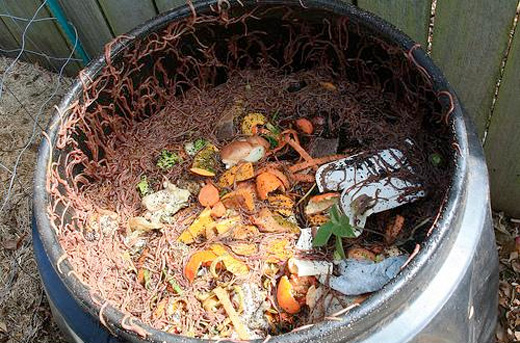Making Dirt!

Green + Brown + Water = Black Gold for the garden.
No garden is complete without a compost pile! A compost pile acts as a giant recycling bin for most decomposeable yard and kitchen waste. What’s more, compost does triple duty as a soil conditioner, mulch and fertilizer. All this wrapped up into one spade full of rich, friable black gold! It’s referred to as black gold because compost feeds the soils’ microorganisms that help to keep plants strong and healthy and adds nutrients like nitrogen to the soil, and helps less than perfect soils like clay and sand drain better.
Fall and winter is a great time to start a compost pile, too. With gardens being pulled up and put to bed for the winter and leaves falling in all those brilliant colors there is plenty of ingredients handy to feed your soil making bin.
Compost piles can come in all shapes and sizes too. Some can be made from shipping pallets or wire, others from scrap lumber or bottomless barrels. Still others can be purchased from home improvement stores or city parks departments. With the surge of home food production and recycling there is a wide variety of compost barrels and bins to choose from.
Compost housing aside, the main focus in producing good quality compost is the kinds of ingredients you add to the pile.
To build a compost pile that is easy to make, fast to decompose and dosen’t smell follow these simple steps.
• Find a suitable location that is easily accessible to the kitchen and the garden.
• The basic ingredients that make up a good compost pile are green and brown materials. Green ingredients, which are high in nitrogen, include grass clippings, spent plants, and vegetable bushes and vines when they have finished producing. Brown ingredients are a source of carbons and include dried leaves, dead non-woody plants and even small twigs.
• MOST IMPORTANT – do not add to your compost pile animal waste from dogs or cats (chicken, sheep, goats, cow and the like are fine), meats, oils, dairy products, diseased plants, weeds that have gone to seed, or plants treated with chemicals.
• Compost piles that have a balance between green and brown materials are the most efficient and break down faster. A ratio of one part green to two parts brown decomposes the fastest. To achieve this ratio simply add one pitchfork of green matter then top with two forks full of brown matter, mixing together. To build a full compost pile use this ratio until the pile is approximately 3ft. x 3ft. x 3ft. A pile of this size will heat up quickly and break down faster.
• To help kick start the process, add a shovelful of garden soil or finished compost. There are several compost starter additives on the market, but they really aren’t necessary if you follow the green to brown ratio.
• The other important ingredient in an efficient compost pile is water. The proper amount of water helps the materials breakdown. Piles with the right amount of moisture will feel damp, like a wrung out sponge. Piles that are too wet will decrease the internal temperature and cause the pile to smell. Piles that are too dry will prevent the pile from heating up, slowing down decomposition. Check the pile weekly and adjust the moisture level if needed, adding more brown material to help dry out piles that are too wet.
• Piles should also be turned weekly so that outer materials can be moved toward the center. Turning a pile improves airflow and keeps the pile from compacting which can also slow down decomposition.
• It takes about two months for a properly managed compost pile to produce a finished product. Your compost is ready when the pile no longer heats up and you can’t identify any of the original ingredients. Compost should be dark brown, moist and smell earthy. At this point the compost can be dug into garden beds. If there are any parts of the pile that have not fully broken down those can be used for mulch to add nutrients to the soil and keep weeds down.
In the end, though, and bin or barrel aside, all that matters is that YOU reuse all the great yard and kitchen waste for a greater good and NOT throw it into the trash or put it down the garbage disposal.
We love to compost everything we can… I’m excited to pick up worms tomorrow for our new worm bin, and once we’ve got some good worm castings we’ll be making some compost tea.
You can never, ever, ever have enough compost!